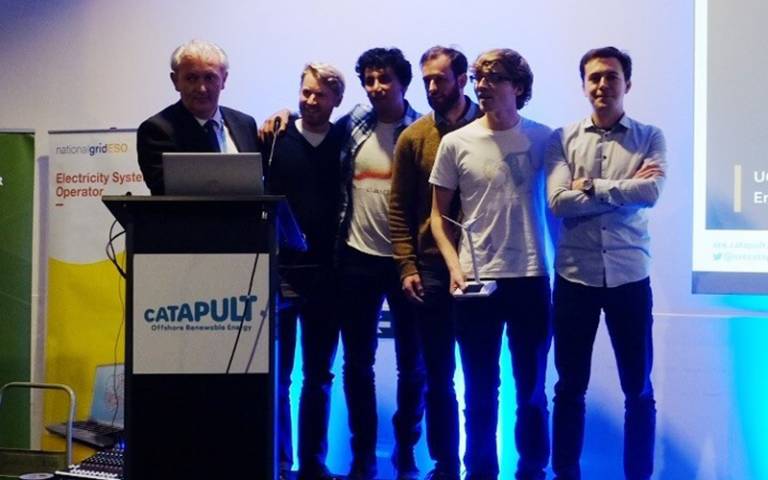Congratulations to our ESDA graduates for winning the ORE Catapult Hackathon 2019
4 November 2019
Clement Attwood, Ayrton Bourn, Connor Galbraith, Camilo Velandia and Laurence Watson have brilliantly answered 'a unique industry challenge for digital innovators' and won a £10,000 prize for their work on wind turbines.

We are very proud of Energy Systems and Data Analytics MSc graduate students Clement Attwood, Ayrton Bourn, Connor Galbraith, Camilo Velandia and Laurence Watson for winning the first ever Offshore Renewable Energy Catapult Hackathon at the Glasgow Science Centre last week, with a total prize of £10,000. The team has worked during 36 intensive hours to 'provide an accurate wind farm Power Available (PA) measurement using data that is already available at operational wind farms', working through the night to provide the most innovative and elaborate answer to the data-led challenge. Despite the lack of sleep but without lacking of skills and humor with their presentation 'Real wind turbines have power curves', they obtained the lowest error in predicting Power Available at either side of wind curtailments.
The National Grid ESO, Catapult, ScottishPower Renewables and independent specialist Mike Anderson, formed the judging panel and elected the winning team in front of an audience of industry, academic and other experts in the field. Offshore Renewable Energy Catapult organised this competition event in partnership with ScottishPower Renewables (SPR), National Grid ESO and the Energy Technology Partnership (ETP).
Dr Aidan O'Sullivan, Director of the Energy Systems and Data Analytics MSc, said:
“This is a fantastic achievement and we at the Energy Institute are very proud of the winning team of ESDA graduates who are taking the skills they’ve learned as part of the MSc and using them to demonstrate how data analytics and machine learning can solve real problems in the energy system.
Watch the winning team's annnouncement here:
Ayrton Bourn, one of the hackathon winners, said:
“The challenge centred on improving the live prediction of generation for a wind farm using meteorological and site level data. We tested several machine learning techniques and engineered a number of additional features before settling on a Random Forest model."
Camilo Velandia, another winner of the hackathon, said:
“We enjoyed the challenge from the outset, especially in the context of helping enable renewables to produce a larger share of the energy mix. Our next step is to develop the algorithm into software that could assist both generators and National Grid ESO to better understand the potential instantaneous output of renewables."
The Energy Systems and Data Analytics MSc (ESDA MSc) is the first programme of its kind in the UK, combining the study of Energy Systems with Data Science.
The programme is aimed at students with a quantitative background who have an interest in energy and are motivated by the use of data science to solve sustainability problems. This advanced degree programme is designed to provide a broad understanding of energy systems, machine learning, programming, energy use in the built environment, energy use in the transport sector and the role of data and advanced analytics in solving relevant sustainability problems.
 Close
Close

